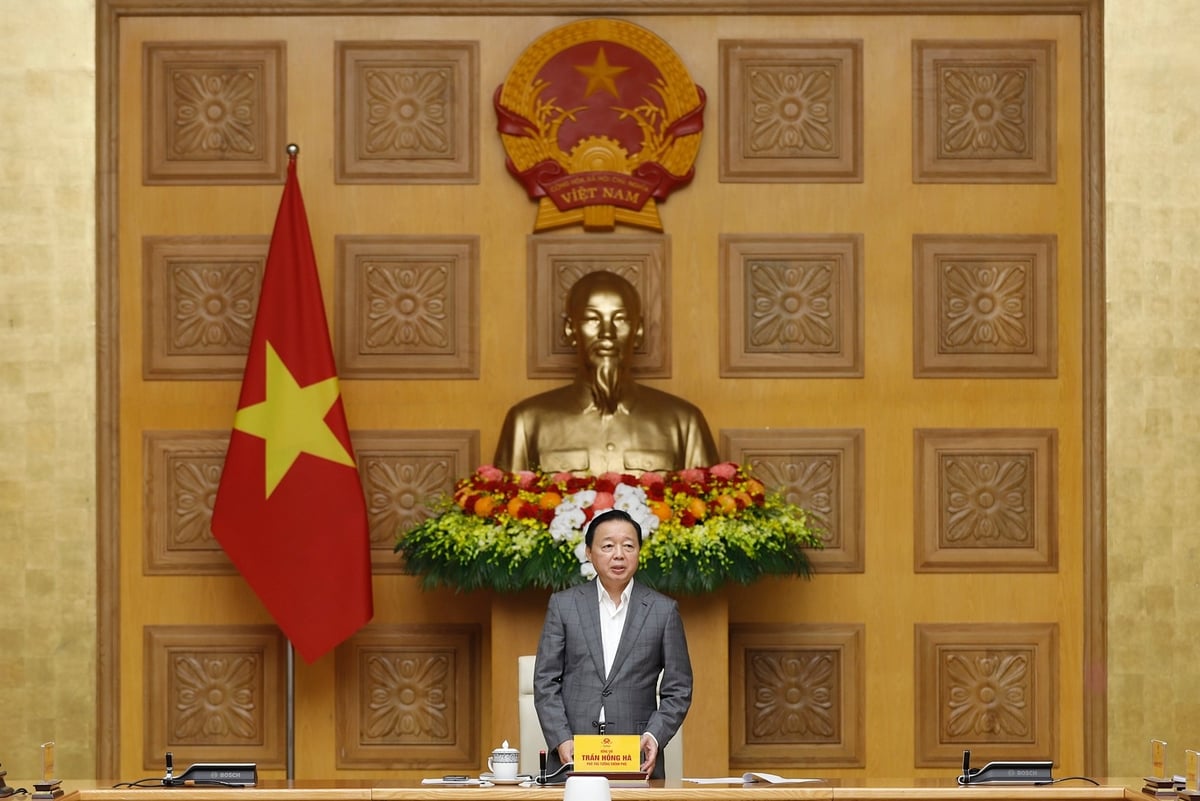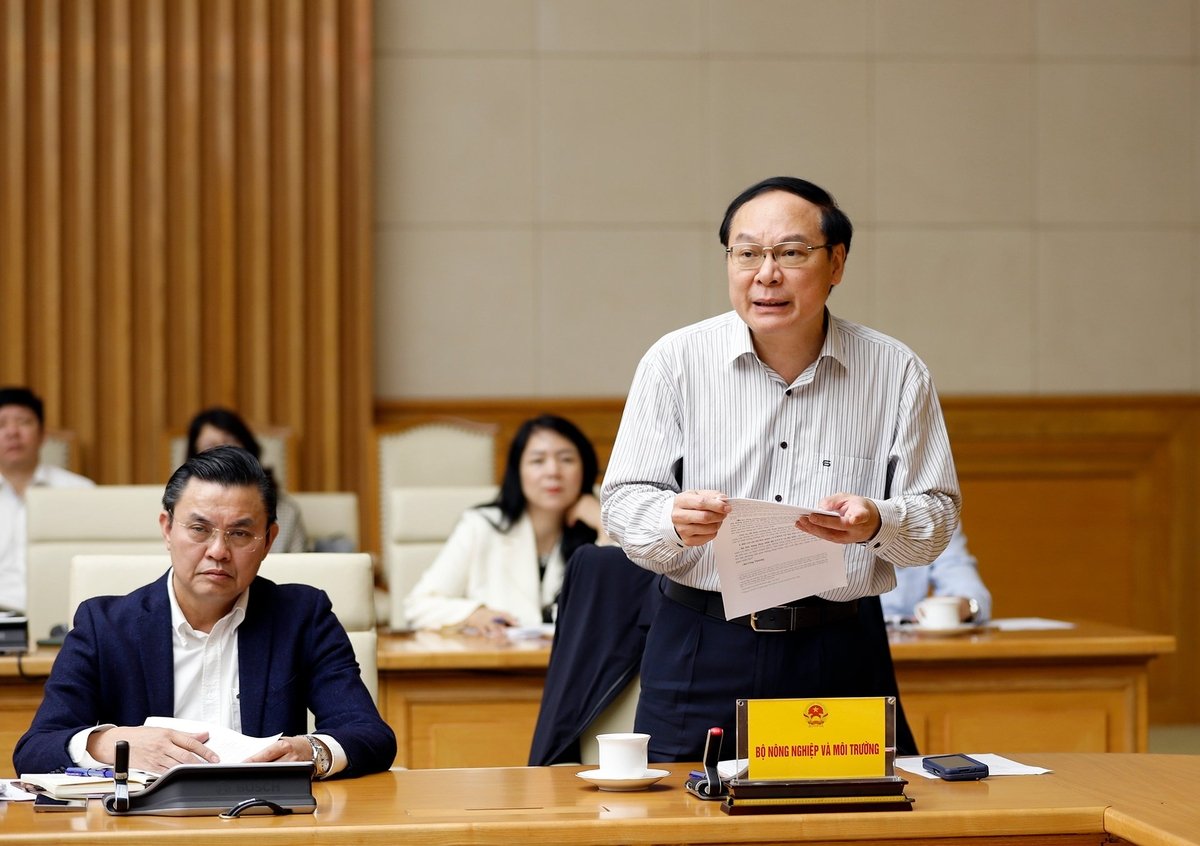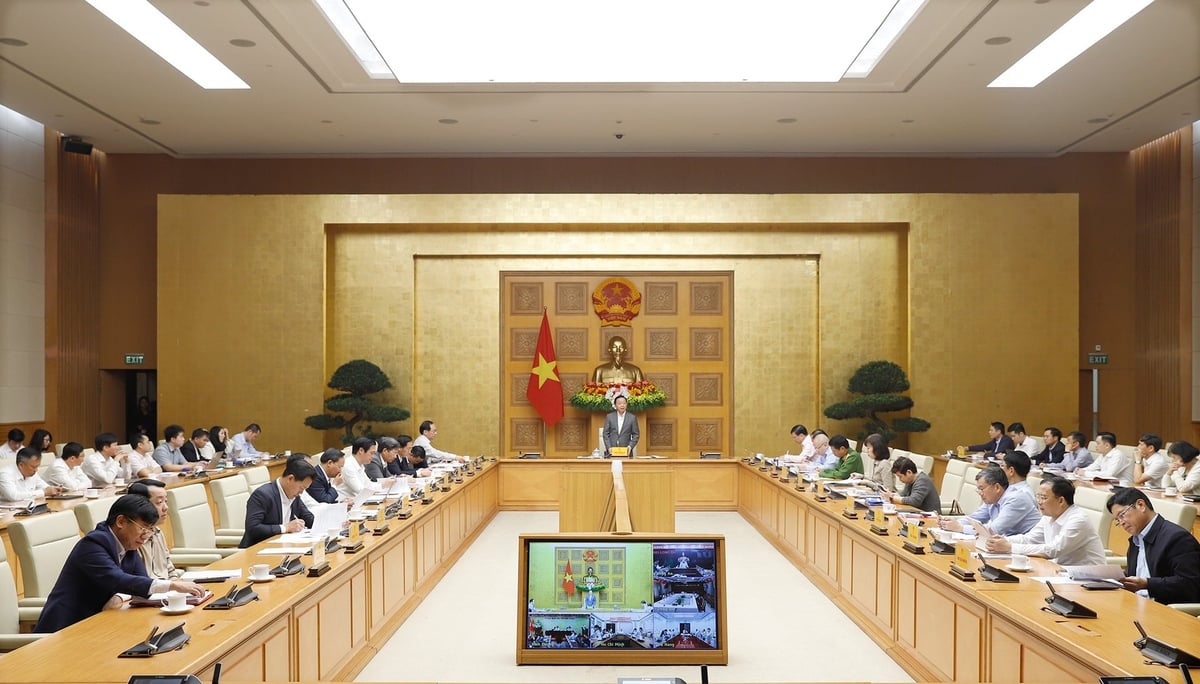May 29, 2025 | 11:48 GMT +7
May 29, 2025 | 11:48 GMT +7
Hotline: 0913.378.918
May 29, 2025 | 11:48 GMT +7
Hotline: 0913.378.918
On the morning of March 27, Deputy Prime Minister Tran Hong Ha chaired a conference on addressing air pollution in big cities across Vietnam. The event was attended by leaders from ministries, departments, and localities—particularly from Hanoi and Ho Chi Minh City, the country’s two largest urban centers, which are currently experiencing the most severe air pollution.

Deputy Prime Minister Tran Hong Ha chaired a conference on air pollution solutions on the morning of March 27. Photo: Khuong Trung.
Deputy Prime Minister Tran Hong Ha underscored the urgency and severity of air pollution in major cities during his address at the meeting. He urged the appropriate agencies and localities to promptly implement concrete measures with clearly defined responsibilities and a roadmap to improve the situation as soon as feasible.
The Deputy Prime Minister observed that air pollution in major cities, particularly Hanoi, has reached alarming levels. This issue has drawn significant concern from top leaders of the Party and the State, who have repeatedly called for urgent solutions.
According to Deputy Prime Minister Ha, despite the fact that the 2020 Law on Environmental Protection explicitly states the responsibilities of all parties—from state agencies and local governments to organizations and individuals—the implementation of legal documents and action plans is still insufficient and is marked by a number of deficiencies.

The Deputy Prime Minister suggested that immediate actions are needed to achieve air quality targets. Photo: Khuong Trung.
The situation will not change without concrete and determined action, he emphasized, despite the fact that we already have the law and directives from all levels of leadership. In particular, the responsibilities of relevant authorities and local leaders must be clarified, and timely action must be taken, as major cities such as Hanoi and Ho Chi Minh City are at risk of severe air pollution that directly impacts public health.
He also underscored that the purpose of this meeting was not to engage in a theoretical discourse or a mere analysis of the situation, but rather to facilitate a practical session that would propose practical answers to the serious problems people are currently encountering. "There is a limited amount of time remaining for further discussion; we must take action immediately."
“This goal is not for 2030—we must achieve concrete air quality targets within this year to protect public health,” the Deputy Prime Minister directed.
He requested that the Ministry of Agriculture and Environment provide a comprehensive report on the current state of air pollution, its causes, and actionable solutions that can be implemented promptly without further delay. The main goal of the measures should be to decrease emissions from major sources of pollution.
He encouraged local authorities, particularly those in Hanoi and Ho Chi Minh City, to submit comprehensive findings on air pollution in their respective regions, identify the primary causes, clarify the responsibilities of relevant agencies, and suggest immediate concrete actions.
The Deputy Prime Minister confirmed that the Government will offer the highest level of assistance to localities in the deployment of air pollution mitigation measures, and will also closely monitor and inspect the progress of implementation.
Deputy Minister of Agriculture and Environment Le Cong Thanh stated in a report from the Ministry of Agriculture and Environment that air pollution has been a significant issue in major urban areas for many years, particularly in the two critical economic regions of northern Vietnam (around Hanoi) and southern Vietnam (around Ho Chi Minh City).

Deputy Minister of Agriculture and Environment Le Cong Thanh reports at the Conference. Photo: Khuong Trung.
Road dust, PM10, and fine particulate matter (PM2.5) have been identified as the primary pollutants, and pollution typically takes place between October and April of the following year.
“In Hanoi, pollution levels are higher than in Ho Chi Minh City due to unfavorable climate and weather conditions. Especially toward the end of the year and during the Lunar New Year (Tet), pollution worsens due to increased production and traffic activity, which are the primary sources,” Deputy Minister Le Cong Thanh explained.
He identified four primary sources of air pollution, with traffic-related activity being the most direct. These include road dust, emissions from old and weakly maintained vehicles, outdated diesel trucks, and construction material transport—all of which are particularly prevalent in Hanoi.
The second significant source is industrial production, particularly in four crucial sectors: steel manufacturing, cement production, construction materials manufacturing, and thermal power plants.
The accelerated urbanization has resulted in a surge in construction activity, which is a third source. There is a significant lack of appropriate dust control and shielding measures at numerous construction sites, which allows pollutants to spread freely.
Open burning activities, including household-level combustion, agricultural residue combustion, and waste incineration, comprise the fourth and final source. Thanh observed that these activities are common, ranging from the burning of votive paper and biomass for heating to the burning of rice straw in fields after harvest and collecting trash points.
Geographical and meteorological conditions increase air pollution. For instance, Hanoi is situated in a humid subtropical monsoon zone and is flanked by high mountains to the west. The city frequently experiences high humidity, limited rainfall, temperature inversions, and windless conditions, all of which impede the dispersion of pollutants and facilitate their accumulation.

Overview of the Conference. Photo: Khuong Trung.
Construction activities are subject to rigorous oversight: Monitor construction projects, such as urban development zones, high-rise structures, transport infrastructure, and public works, and insist on the implementation of appropriate dust barriers and water spraying to reduce dust.
Improved regulation of traffic-related pollution: Regulate truck routes, control aging vehicles, and promote the use of public transportation.
Improved urban sanitation: Install water sprinkling systems along major roads, remove dust, and clean streets.
Control of agricultural residue and open burning: Enhance enforcement of regulations prohibiting the burning of rice straw and waste, promote the recycling of crop residues, and rigorously regulate activities such as biomass burning, outdoor grilling, and the burning of votive offerings. Assign and superintend the responsibility for enforcement at the commune and district levels.
Industrial emissions regulation: Implement automated monitoring of emissions from factories and enforce strict disciplinary action for any violations.
Increase public awareness: Launch communication and education campaigns about the harms of air pollution and the measures to reduce it.
Reports from a variety of ministries, sectors, and localities that have been identified as having high air pollution dangers were also included in the conference. These reports presented both the current situation and proposed solutions.
Translated by Linh Linh

(VAN) Ms. Nguyen Thi Dung, Deputy Director of Ngoc Hoang Cooperative, shared about the journey of bringing dragon fruit to Europe, achieving annual revenues in the billions of VND.

(VAN) Bamboo products from Thang Tho Bamboo Cooperative have reached many countries around the world, while also creating jobs for local workers.

(VAN) The Management Board of Con Dao National Park reported that a green sea turtle, tagged in the Philippines, has traveled thousands of kilometers to lay 84 eggs on Bay Canh Islet.

(VAN) Green technology is paving a new path for sustainable aquaculture in the Mekong Delta in particular and across the country in general, helping reduce emissions and adapt to climate change.

(VAN) On May 27, La French Tech Vietnam (the French startup and innovation community in Vietnam) held the French Tech Summit Vietnam 2025.
/2025/05/27/4731-2-223159_980.jpg)
(VAN) No votive paper, no styrofoam, no plastic bags, no plastic bottles, and no single-use plastic trays are the key rules tourists should keep in mind when visiting Con Dao.

(VAN) In the fight against plastic pollution, Vietnam has been demonstrating a proactive, pioneering, and active role in addressing the greatest environmental challenge today.